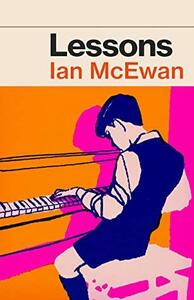Take a photo of a barcode or cover
Once again I'm reminded what it's like to be in the presence of a truly great novelist.
McEwan knocks it out the park with his story about one man Roland, and how his life was shaped by both the singularities of his childhood and the grand contours of history. It's a story about unlived lives, relationships, how we make meaning, and the messy complicated things that are human beings. If his treatment of world and British history felt a little didactic and slow at times, he made up for it with a keen eye for how we understand responsibility, both personal and collective.
One of the hinges of the novel is the 14-year-old Roland's sexual involvement with his piano teacher, so childhood abuse and trauma feature prominently, the unexpected ways its tendrils reach into a life.
McEwan's touch is so light and knowing, his agility between different styles and registers magisterial. The book I started reading afterwards felt plodding and fussy by comparison. His writing manages to be beautifully incisive while steering well clear of moralism. He's just another punter trying to make sense out of the world, McEwan's writing suggests.
Reading this book in parallel with Septology really brought home the way good writing can actively induce moods in the reader. I found myself viewing the world differently while reading both books. It was strange to be sharing Roland's sadness at the slow and tragic demise of his wife, or taking on Asle's silken nostalgia in frozen Norway, while relaxing by the river on summer holiday. But such is the magic of literature I guess.
McEwan knocks it out the park with his story about one man Roland, and how his life was shaped by both the singularities of his childhood and the grand contours of history. It's a story about unlived lives, relationships, how we make meaning, and the messy complicated things that are human beings. If his treatment of world and British history felt a little didactic and slow at times, he made up for it with a keen eye for how we understand responsibility, both personal and collective.
One of the hinges of the novel is the 14-year-old Roland's sexual involvement with his piano teacher, so childhood abuse and trauma feature prominently, the unexpected ways its tendrils reach into a life.
McEwan's touch is so light and knowing, his agility between different styles and registers magisterial. The book I started reading afterwards felt plodding and fussy by comparison. His writing manages to be beautifully incisive while steering well clear of moralism. He's just another punter trying to make sense out of the world, McEwan's writing suggests.
Reading this book in parallel with Septology really brought home the way good writing can actively induce moods in the reader. I found myself viewing the world differently while reading both books. It was strange to be sharing Roland's sadness at the slow and tragic demise of his wife, or taking on Asle's silken nostalgia in frozen Norway, while relaxing by the river on summer holiday. But such is the magic of literature I guess.
Between 3 and 4 stars. The book starts with a story written in a very pleasant way. But at approximately 3/4 of the books, when it could finish on a good way, more drama appears in the scene, which apparently helps the author to introduce small bites of what could be called, from my point of view, an opinion article. The book is almost nice. The boredom that makes you looking forward to finish the book ruins a little bit the big experience that could be this book.
Olipa tämä valtava kokemus! Nautittava, iso, piti todellakin sisällään yhden elämän.
I wanted to enjoy this book a lot more than I ended up. Maybe expectations were too high, given this is by the hand of the Ian McEwan. I did appreciate the baseline story, the one about Roland and the challenges life has thrown at him. However, I found that the many elaborations on politics and world events were out of place and were distracting. I understand these were there to set the scene, but am unsure whether they should have taken up so much room as they ended up doing. I struggled, therefore, reading through the first third of the book, only really enjoying the second half, where focus is more on Roland and his family. A matter of wanting to have too much in one book ? It is still a very beautiful story to read, I just do not think it should have taken 480 pages.
challenging
reflective
slow-paced
Plot or Character Driven:
Character
Strong character development:
Yes
Loveable characters:
Complicated
Diverse cast of characters:
N/A
Flaws of characters a main focus:
Yes
Masterful writing and storytelling. I had to take my time because I wanted to properly digest each chapter. I bought the hardback and thought I would listen to the audiobook on walks, but the language is so rich that I decided to stick with the print version. The story is sweeping in historical scope and disturbing in some of its themes, but again, Ian McEwan is a giant in his creative command of the language that I was ultimately moved and so impressed with the book.
adventurous
emotional
funny
informative
inspiring
reflective
sad
medium-paced
Plot or Character Driven:
A mix
Strong character development:
Yes
Loveable characters:
Complicated
Diverse cast of characters:
Yes
Flaws of characters a main focus:
Yes





